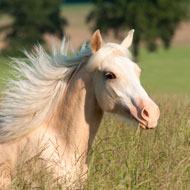Control of Horses Bill welcomed

Welfare charities estimate there are around 3,000 horses being illegally grazed in England.
Solutions to illegal fly grazing will be debated in parliament through a Control of Horses Bill launched in the House of Commons this week. The news has been welcomed by welfare and countryside organisations.
A private members bill was introduced by Julian Sturdy, MP for York Outer on July 15, to tackle the growing problem of fly grazing – where horses are illegally grazed on public or private land without the permission of the landowner.
Welfare charities estimate that at least 3,000 horses are currently being fly grazed in England alone. The practice causes serious equine welfare problems, damage to crops and fencing, loss of use of land and risks to the public.
World Horse Welfare took in 76 per cent more horses last year than in 2012, while the RSPCA receives around 500 calls a month relating to concerns about horse welfare.
Lee Hackett, director of equine policy at the British Horse Society, said: “There are literally thousands of horses out there in desperate need of help and yet the existing legislation has not allowed us to assist as quickly and effectively as the horses desperately need us to. It is simply not fit for purpose.
“Additionally the costs to landowners who are affected by fly grazing can be enormous and they are victims just like the horses.”
In recent years, members of the CLA – who own around half the land in rural England and Wales – have reported serious problems with fly grazing.
CLA president Henry Robinson said: “The horses are often dumped in large numbers and frequently have serious welfare problems. They are left in open spaces or fields which are not designed to contain them and they represent a clear risk to the public, and particularly motorists.
“Our members face considerable obstacles in having these animals removed from their property, not least because the current legal process for seeking their removal is not fit for purpose. It is mired with uncertainty and, all to frequently, eye watering costs.”
A bill came into force in Wales earlier this year that gives local authorities the power to tackle those who deliberately or negligently allow their horses to graze on land without the permission of the owner. It is hoped similar legislation will come into force in England to prevent the problem simply crossing over the border.



 The BSAVA has opened submissions for the BSAVA Clinical Research Abstracts 2026.
The BSAVA has opened submissions for the BSAVA Clinical Research Abstracts 2026.